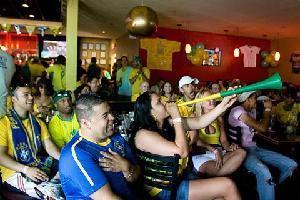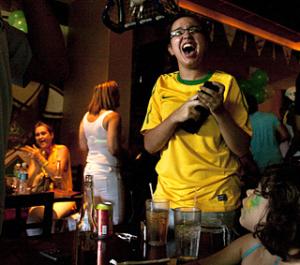 |
|
Vuvuzelas added to the festive atmosphere at Caf'e Belo when Brazil won its game |
At Café Belo in the working-class Boston suburb of Somerville, Brazilian fans are celebrating a win over Ivory Coast. A four-year-old boy sings 'I am Brazilian, and proud,' while the adults dance barefoot. And there's the yellow and green vuvuzela. Just one of those horns is annoying, but nobody here seems to mind.
Everyone's wearing Brazil's national colors, including Danisy Drzic and her husband Balsha. They're from Virginia, in Boston on business. "We basically just went to Quincy Market and asked people where are the Brazilians going to see the game?" Danisy explains.
She's here for a taste of her home country: the fried plantains, the grilled pork sausages. She's here to see Brazil score. Danisy's husband Balsha is from Serbia, and Serbia made it to the World Cup Finals. Even so, he's taking this match more seriously than she is. "I like Brazil," he admits, "they're much stronger than in years
 |
|
The action had the fans on their feet, screaming for their team |
The international flavor of the World Cup continues outside the bar and restaurant, where Liniker Kemke is hanging out after the game. Kemke's grandfather immigrated to Brazil 38 years ago from Germany. And his father named him after a soccer star. But not after [Brazilian star] Pele. Not after [German star] Beckenbauer. After a star player for Germany's rival.
"[It was the] World Cup of 1986," he says. "Lineker was a forward of England team. And my father loved that guy, and he just put that name on me. Liniker." This Brazilian with a German grandfather named after an English striker says if Brazil doesn't win the Cup, then he hopes Germany does.
Beer and pretzels for Germany's fans
Well, so do the people over at the Goethe Institute in Boston. Compared with Café Belo, these viewing parties are a little more organized. You have to register online, which also gets some tickets for Beck's beer and Bavarian pretzels.
And while the crowd is into the game just as much as the Brazilians, it's still very civilized, as Andreas Hilfinger, a German researcher working in Boston observes. "If you go to a bar, you always get a lot of drunken thugs. Doesn't seem to be the case here."
"It's like having people over in your living room to watch it. It's much more exciting than watching by yourself, but you don't have random idiots throwing beers around," he points out.
Hilfinger is here with his US coworkers. There's a Ghanaian in the crowd with his German roommate.
And then there's Japanese student Hidefumi Tomita. "I really like the German people," he says. "If it's Europe, it's Germany, if it's Asia, I support for Japan."
A global game in a global city
Boston's always been an international city, so the excitement here about the World Cup is not surprising... a Japanese student for Germany... a Serb for Brazil... a Brazilian named after an English forward.
Perhaps it's not just the improving US soccer team that's fueling world cup interest among Americans. The passion of these transplanted soccer fans is infectious, and it's making Americans feel more a part of this global game.
盤(pán)點(diǎn)世界杯五大點(diǎn)球大戰(zhàn)
澳姐妹不間斷看世界杯87小時(shí)創(chuàng)紀(jì)錄
(來(lái)源:VOA 編輯:陳丹妮)
